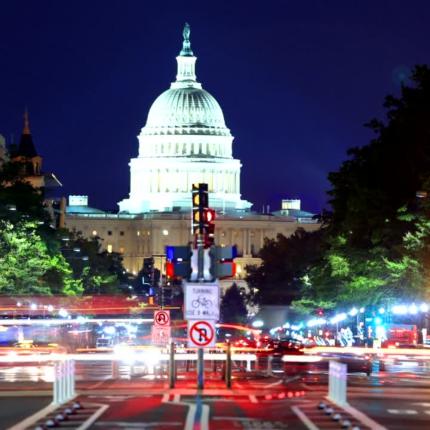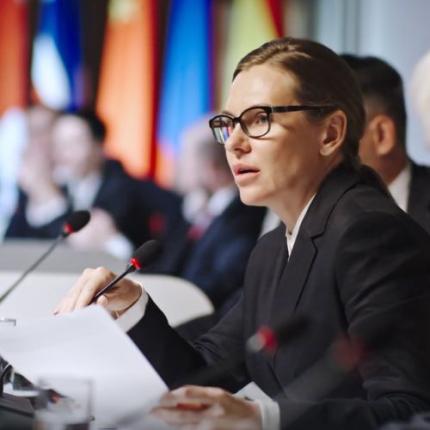Research from Georgia Tech's Jimmy and Rosalynn Carter School of Public Policy finds many presidential traits correlate to a successful U.S. economy — just not the ones you might expect.
Americans consistently rank inflation and the state of the U.S. economy as the most significant issues in 2024.
So, which candidate is better for the U.S. economy in the upcoming presidential election? Does the president really affect it, or does the steady hum of markets and government bureaucracy continue the same no matter who is in office?
Zak Taylor, an associate professor at Georgia Tech's Jimmy and Rosalynn Carter School of Public Policy, has asked these questions for a decade.
He ranked the presidents' economic leadership from George Washington to George Bush and found that, yes, the person in the Oval Office has a substantial impact on how well the economy does under their administration. What's more, the best and worst economic leaders shared similar traits — just not the ones we might expect.
Take Our Quiz
Before we dive into the research, can you guess which presidential traits do and don't affect the U.S. economy? Click through the slides below to test your knowledge.
Examining Data Over Emotion
Are you surprised by some of the answers?
"None of the stuff that we tend to assume matters really does for being president, at least in terms of economic leadership," Taylor said.
During President Barack Obama's reelection, Taylor heard a lot of discourse about politics and the economy but found most of it was based on emotion rather than the readily available numbers.
"We've got hard data on economic growth, inflation, unemployment, how well the stock market performs, federal debts, all sorts of things," he said. "So we can use this to create some objective measures, which I did in 2012 just because I thought it was an interesting question."
Best and Worst Presidents for the U.S. Economy
Taylor found that between 1789 and 2009, the U.S. economy performed the best under Franklin D. Roosevelt, Warren Harding, Rutherford B. Hayes, and William McKinley. The weakest economic leaders were Chester A. Arthur, William Henry Harrison, Herbert Hoover, and Martin Van Buren.
Taylor's 2012 article has since evolved into a book on presidential leadership during the Gilded Age and a forthcoming volume on presidential economics. In both, he dives deeper into which presidential traits do and don't impact the U.S. economy.
"When you look at the presidents who do well economically and who do poorly, a couple of things come through really strongly," he said.
Presidential Traits That Positively Impact the U.S. Economy
A strong vision for where they want to take the country
"It doesn't matter what's in the vision, as long as you have one. If it's relatively clear, compelling, and consistent, good things happen."
Ability to negotiate and compromise
"Presidents who can do that can usually get policy and legislation passed that moves the country forward in a way that keeps everybody on board."
Active view of government
"They believe the president and the government have a role to play in managing the economy. Not necessarily a liberal or conservative role, but just a belief that 'Hey, we've got a job to do to make markets work.'"
Active in the face of crisis
“Presidents who do nothing in the face of a crisis, such as the Great Depression or financial crisis during the Gilded Age, tend to do very, very poorly.”
Able to build and maintain trust in major political and economic institutions in the U.S.
“High-trust societies tend to have better economies than low-trust societies. And when trust evaporates within society, then all kinds of economic problems break out.”
Neutral or Negative Presidential Traits
On the other hand, presidents who make reactive or impulsive policy decisions tend to be poor economic leaders, Taylor said.
"You get incohesive, awkward policies that don't often match up," he explained. "For example, Benjamin Harrison just wanted his party to win elections, so he did whatever it took. But that resulted in a weird mix of policy, budgets, taxes, and spending that threw the U.S. financial balance out of whack and sent us into the Panic of 1893."
Finally, we have presidential traits that, perhaps surprisingly, do not impact the U.S. economy one way or the other. In his research, Taylor found that presidents' political party, education level, business experience, and moral character do not make a difference.
"The conventional wisdom that Republicans are better than the Democrats at managing the economy, or business people are better at it than lawyers, or outsiders are better than Washington insiders — this research upends that," Taylor said.
Explore More
This fully immersive, semester-long experience in Washington, D.C. is available to the entire undergraduate community at Georgia Tech.
Ivan Allen College alumni share how they make an impact in the nation's capital.
The diplomats teach courses and hold informal mentoring sessions for students to discuss careers in foreign service.



